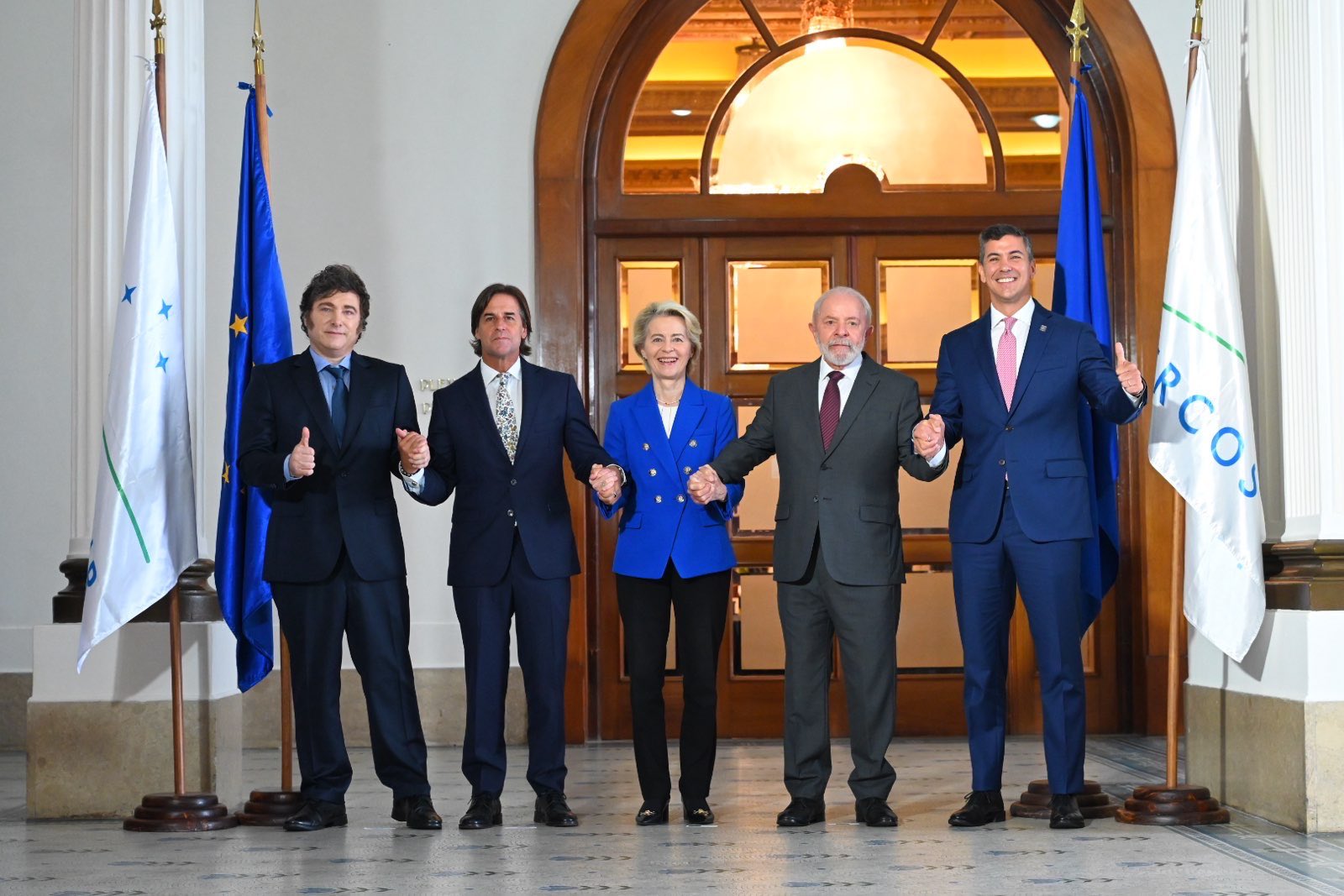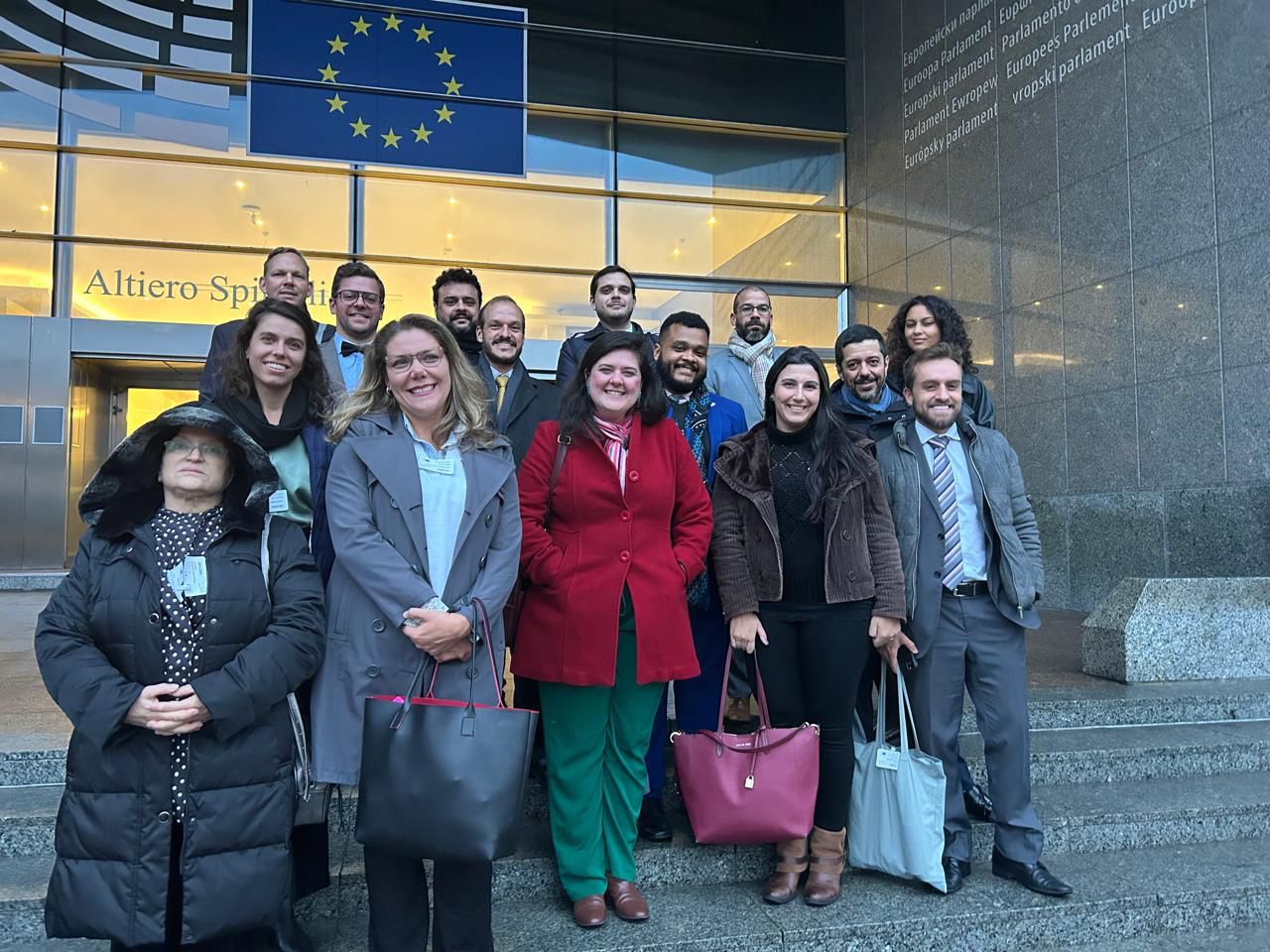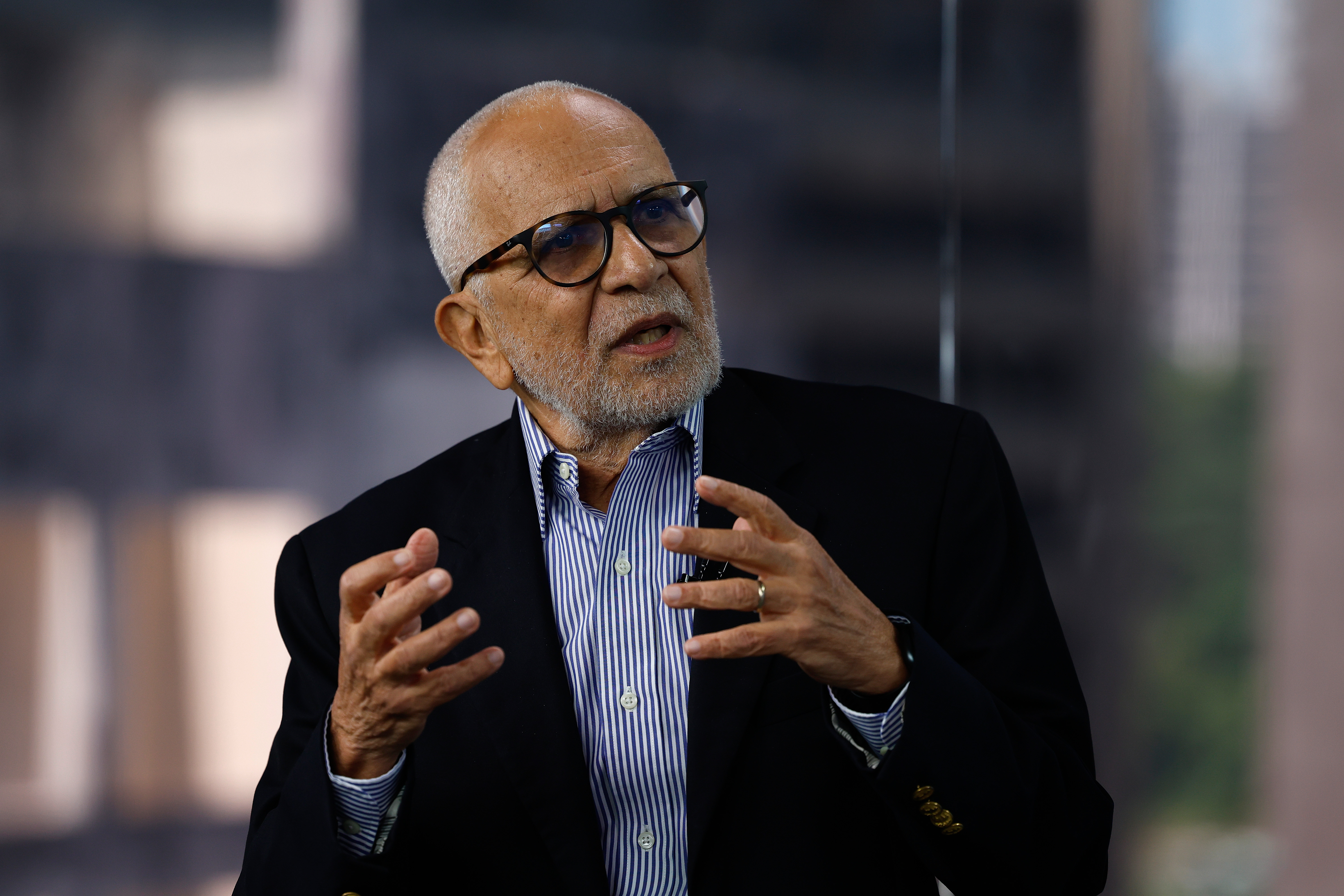Mercosur-EU Agreement: a historic milestone for international trade
- 06 december 2024

Photo: Ricardo Stuckert
On December 6, 2024, the conclusion of the Partnership Agreement negotiations between the Southern Common Market (Mercosur) — comprising Argentina, Brazil, Paraguay, and Uruguay — and the European Union (EU), composed of 27 member states, was officially announced. This marked the end of a diplomatic process that spanned more than two decades. The official announcement was made by the President of the European Commission, Ursula von der Leyen, during the 65th Mercosur Heads of State Summit held in Montevideo on December 5 and 6.
CEBRI ANALYSES
- Brazil-EU Relations in Times of Permanent Crises: Reflections and Action Proposals | A joint CEBRI-KAS Brazil initiative
- CEBRI-Revista | What Can the EU Offer Brazil?
- CEBRI-Revista | The Mercosur-EU Agreement in the New Global Context
- The Ratification of the EU-Mercosur Agreement from the European Perspective – Now or Never?
- CEBRI-Revista | Brazilian Perspectives, Awaited Dialogues: Resistance to the Mercosur-EU Agreement
Historical Context
Negotiations leading to this agreement began in the late 20th century. The foundations for a strategic biregional partnership were laid during the first Summit of Heads of State and Government of Latin America, the Caribbean, and the EU, held in Rio de Janeiro in June 1999. This summit propelled efforts between Mercosur and the EU to forge a bilateral treaty aimed at greater economic and trade integration between the two blocs.
Next Steps
With negotiations concluded, Mercosur and the EU will begin preparing the agreement texts for signature. This includes finalizing the text, conducting legal reviews, and translating it into the official languages of the member states. Once finalized, the agreement will undergo approval procedures within each bloc, including review by the European Council and Parliament. Following these approvals, the treaty will be signed, ratified, and come into force, heralding a new chapter in the relationship between two of the world’s largest economic blocs.
Agreement Dimensions
The Mercosur-EU Partnership Agreement encompasses a combined population of approximately 718 million people and a Gross Domestic Product (GDP) of an estimated $22 trillion. This makes it not only the largest agreement negotiated by Mercosur but also one of the most significant agreements entered into by the EU with trading partners.
What is the Mercosur-European Union Partnership Agreement? What are its main points?
The Mercosur-European Union Partnership Agreement is one of the largest bilateral free trade agreements in the world, representing new opportunities for trade and investment as well as an important platform for dialogue. In addition to strengthening political cooperation mechanisms between the two blocs—which share common values and interests, such as the defense of democracy, multilateralism, and the promotion of human rights—the Agreement outlines significant economic and trade benefits and reinforces the commitment of both parties to environmental, social, and economic agendas.
What does the agreement represent for Brazil?
Brazil accounts for approximately 80% of the trade conducted between Mercosur and the European Union. From Brazil's perspective, the Agreement with the European Union, the country's second-largest trading partner, holds multifaceted strategic value. It is expected to strengthen the diversification of Brazil's trade partnerships on broader and more sustainable foundations, a crucial aspect for expanding its global economic integration and increasing its participation in global value chains (GVCs). The Agreement also aims to drive the modernization of Brazil's industry by integrating the country into the European Union's production chains, while boosting investment flows and simplifying import and export processes.
Aligned with the shared objectives of the green transition, the Agreement facilitates the expansion of strategic partnerships focused on sustainable development, leveraging Brazil's clean energy matrix to enhance the export of renewable energy and the manufacturing of low- or zero-carbon products. Under President Lula's leadership since 2023, the Brazilian government has paid special attention to national interests and concerns, prioritizing areas such as industrial development, sustainability, and the preservation of policy space for strategic sectors, including public health, technology, and innovation.
The Role of the G20 in the Negotiations
For some time, there was an expectation that the Agreement would be signed during the G20 Summit. Despite the frustrating delay, the conclusion of the Mercosur-EU Agreement negotiations took place shortly after the G20 Leaders’ Summit, held on November 18-19, 2024, in Rio de Janeiro. The Agreement symbolizes the commitment of the economic blocs to trade integration and sustainable development agendas, a topic emphasized in the final declaration of the G20 Leaders' Summit.
Brazil’s Finance Minister, Fernando Haddad, highlighted that the positive progress of the negotiations reflects Brazil’s appeal, as G20 leader in 2024, for a “sustainable reglobalization from social, economic, environmental, and geopolitical perspectives.” European Commission President Ursula von der Leyen argued that "the agreement is not just an economic necessity; it is a political necessity.” Beyond the commercial advantages, both parties view the Agreement as a reaffirmation of shared values such as the defense of democracy, human rights, and the fight against climate change.
Green Protectionism and Points of Sensitivity
One of the main hurdles in the negotiations was the EU’s demands related to environmental protection. Brazil's position was that the EU sought to implement a form of “green protectionism,” in which trade barriers were masked as environmental protection policies. An example is France’s insistence on the inclusion of "mirror clauses," a mechanism requiring foreign products sold in the EU to adhere to the same conditions imposed internally on European producers.
This issue was also controversial within the EU, with France persistently opposing the Agreement, potentially complicating its finalization even after a decisive “handshake” by the leaders. President Emmanuel Macron argued that the Agreement could threaten the country's agricultural sector. Italy echoed France's concerns, stating that although industrial policy is progressing in the right direction, the terms related to agricultural production need to be reconsidered.
Delegation in Germany

In December 2024, the Konrad Adenauer Foundation (KAS) organized a delegation of Brazilian opinion leaders for a visit to Berlin and Brussels to deepen the dialogue on Brazil-EU relations. Representing CEBRI, participants included Léa Reichert, Deputy Director of Projects, and Marianna Albuquerque, Senior Fellow and Professor at the Institute of International Relations and Defense of the Federal University of Rio de Janeiro (IRID-UFRJ). The initiative addressed topics such as defense, trade, and foreign policy, highlighting Germany’s role as a strategic partner for Brazil in a transforming world.
The program aimed to provide qualified analyses of Brazil’s political landscape and foreign policy while promoting an exchange of perspectives and experiences between Brazilian analysts and European partners. Key topics included Brazil's presidency of the G20, the organization of the T20 and G20 summits, the hosting of COP30 in Brazil, and the country’s upcoming BRICS presidency, with mentions of the strategic impact of the Mercosur-EU Agreement in this context.
The delegation visited institutions such as the Bundestag, KAS’s headquarters in Berlin, NATO, and the European External Action Service (EEAS) in Brussels. Meetings with German and European experts enriched the discussions, broadening mutual understanding of bilateral relations and international challenges and opportunities.
The visit coincided with the announcement of the conclusion of the Mercosur-EU Agreement negotiations during the 65th Mercosur Heads of State Summit. Trade relations between these two blocs remain a central topic of the CEBRI-KAS partnership. The discussions during the trip contributed to a deeper understanding of this issue, strengthening the partnership’s mission to disseminate knowledge and propose ideas for Brazil-EU bilateral relations.
Interview with Ambassador José Alfredo Graça Lima

Photo: Tânia Rêgo/Agência Brasil
Check out the interview with Ambassador José Alfredo Graça Lima, Vice-Chairman at the Board of Trustees at CEBRI. During his tenure as Undersecretary-General for Integration, Economic, and Trade Affairs (1998–2002), he was responsible for all bilateral, plurilateral, biregional, and multilateral trade negotiations involving Brazil and Mercosur.
Watch the full interview HERE.
